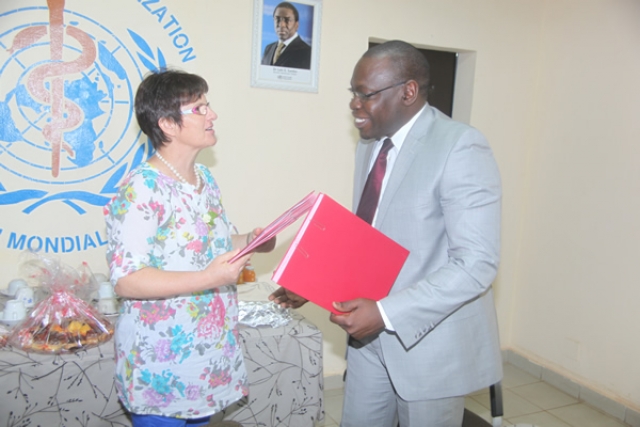UNICEF and WHO join efforts in Mali - Signing of a Memorandum of Understanding
 Bamako, 12 June 2013 – As part of response to humanitarian emergencies, the UNICEF Representative in Mali, Françoise Aackermans and the WHO Representative in Mali, Dr. Ibrahima Socé Fall, met on 11 June 2013 to sign a Memorandum of Understanding (MoU) between the two agencies of the United Nations. The MoU sets out a framework for collaboration, specifying the roles of each agency in the implementation of the joint plan. The objective is to ensure effective and coordinated pooling of the resources of the two partners in providing technical and financial support to the Ministry of Health of Mali.
Bamako, 12 June 2013 – As part of response to humanitarian emergencies, the UNICEF Representative in Mali, Françoise Aackermans and the WHO Representative in Mali, Dr. Ibrahima Socé Fall, met on 11 June 2013 to sign a Memorandum of Understanding (MoU) between the two agencies of the United Nations. The MoU sets out a framework for collaboration, specifying the roles of each agency in the implementation of the joint plan. The objective is to ensure effective and coordinated pooling of the resources of the two partners in providing technical and financial support to the Ministry of Health of Mali.
The health situation in Mali remains worrying. According to data published in 2013 by the United Nations system, Mali has the third highest under-five mortality rate worldwide (176 per 1000 live births). Infant (under-one) mortality is still high (98 per 1000 live births). One woman out of 28 is at risk of dying from a pregnancy. This situation has been worsened by the armed conflict that has been raging in the north of the country since February 2012, through destruction of the social and health infrastructures and the departure of staffl . Adding onto the situation is the nutritional crisis that has been rife since several years, with an overall acute malnutrition rate of about 10% (critical threshold) and a moderately severe acute malnutrition rate above 2%.
« The prevailing situation makes it incumbent upon us to work together » said Françoise Aackermans. « We have a common intention to unite our efforts, bring our teams together around the table and meet regularly in order to move forward. In this Memorandum of Understanding, the operative words are: partnership, coordination, analysis, information sharing, transparency, trust, coherence and effectiveness. »
For his part, Dr, Ibrahima Socé Fall stated: « We are here to solve problems together and support the authorities of Mali to address the needs of the populations. We should not be afraid of problems. On the contrary, we should remain in a problem-solving mode. The quality of our joint work to the benefit of Mali should be acknowledged. We have reached a cohesive consensus. »
The Memorandum of Understanding sets forth the priority actions to respond to emergencies, the joint strategies and the sharing of work between the two agencies, for each sector: Health; Water, Sanitation and Hygiene (WASH); and Nutrition. Figuring among the priorities are: revitalization of health centres and hospitals; improvement and management of WASH services in health facilities; and implementation of nutrition advocacy, policies and strategies. Furthermore, through the Cholera Coordination Group, UNICEF and WHO have committed themselves to preventing and responding to cholera epidemics.
UNICEF and WHO commit themselves to playing a leadership role in strategic dialogue. The two partners will facilitate a harmonized intersectoral approach among the three above-mentioned clusters of sectors, for enhanced coordination with the Government.
The two agencies have agreed on the complementarity of their roles while respecting their respective mandates.
UNICEF:
UNICEF is at work in over 150 countries and territories to help children to survive and develop from their youngest age up to the end of adolescence. As the world’s leading supplier of vaccines to developing countries, UNICEF provides support for child health and nutrition; access to safe drinking water and sanitation facilities; quality basic education for all boys and all girls; and child protection from violence, exploitation and AIDS. UNICEF is entirely financed by voluntary contributions from private individuals,foundations, and governments. For more information on UNICEF and its activities: www.unicef.org
Follow us on Twitter and Facebook
WHO:
WHO is the directing and coordinating authority in health, in international work within the United Nations system. It has a representative office in all Member States of the United Nations. It is responsible for directing global health action; defining health research programmes; setting standards and criteria; presenting evidence-based policy options; providing technical support to countries; and monitoring and assessing public health trends: www.who.int
For further information, please contact:
Hector Calderon, Head of Communications, UNICEF, Mali, Tel +223 75 99 40 89 hcalderon [at] unicef.org
Cindy Cao, Public Information and Media Relations Officer, UNICEF, Mali, Tel +223 75 99 58 46 ccao [at] unicef.org
Abdoulaye Cisse, Communications Officer, WHO, Mali, Tel + 223 63623135 cissea [at] ml.afro.who.int


